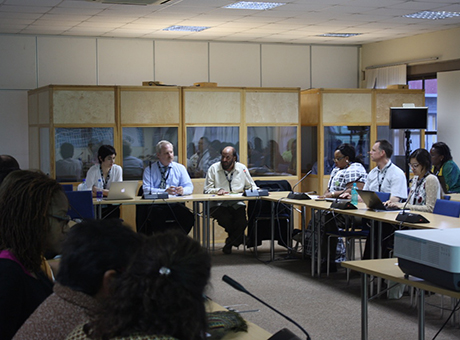
The second session of the Preparatory Committee of
the United Nations
Conference on Housing and Sustainable Urban Development (Habitat
III) is convening this week in Nairobi. Habitat III, which will take place in
Quito in October 2016 intends to outline a “New Urban Agenda”.
A side event entitled “Civil society and local
government’s expectations for Habitat III” was held on Tuesday evening,
and represented a cross-sector dialogue of civil society and local government
networks with national authorities and UN agency representatives [1].
Key presentations
The side event included a number of presentations:
(a) Civil society and local governments’
expectations and proposals for the New Habitat Agenda and Habitat III and the
legacy of Habitat II.
(b) Outcomes of the research “Habitat III
National Reporting Processes: Locating the Right to the City and the Role of
Civil Society“, presented b yBarbara Lipietz and Rafaella Lima from the DPU.
(c) Global Platform
for the Right to the City: outcomes of the São Paulo Right to the
City international meeting and plan of action; Outcomes of the World Social
Forum 2015.
DPU is proactively engaging with Habitat III
discussions
The DPU has been proactively engaging with the
Habitat III process through our research into the national reporting processes,
which was first presented at the World Social Forum in Tunis in
March.
Last week, in the build up to the event in Nairobi
we also hosted a roundtable in London in collaboration with BSHF (Building and Social Housing
Foundation) to elaborate understandings of the right to the city and
aspired outcomes in the months leading up the Habitat III.
Recommendations emerging from Prepcom 2
A number of recommendations for Habitat III emerged
from discussions at the event, including:
·
Habitat
III must build on the 1996 Istanbul Declaration and commitments made at Habitat
II;
·
Habitat
III should be as inclusive as possible with multiple channels for civil society
and local government engagement;
·
Habitat
III commitments should focus on implementation of commitments along with clear
monitoring and evaluation mechanisms;
A joint platform on the right to the city?
In addition, participants affirmed the value and
need to continue working on a joint platform to strengthen civil society and
local governments’ voice in Habitat III – which is currently seen as a step
back from Habitat II’s more open process of formulation.
There was general enthusiasm for the Global Platform
for the Right to the City to act as one such conduit.
[1]The organisers of the side event
included: Habitat International Coalition-Housing and Land Rights Network
HIC-HLRN (Egypt) | Polis Institute, National Forum for Urban Reform (Brazil) |
Mazingira Institute (Kenya) | Rooftops Canada | International Alliance of
Inhabitants | Communitas Coalition | Ford Foundation | Action Aid | United
Cities and Local Governments (UCLG), Commission on Social Inclusion,
Participatory Democracy and Human Rights | Development Planning Unit,
University College London (UCL) | Habitat for Humanity | Cities Alliance | SDI
| WIEGO | Streetnet | National Front of Mayors, Brazilian Association of
Municipalities (Brazil).